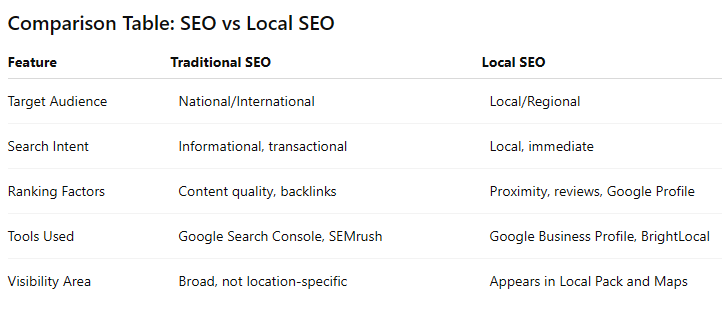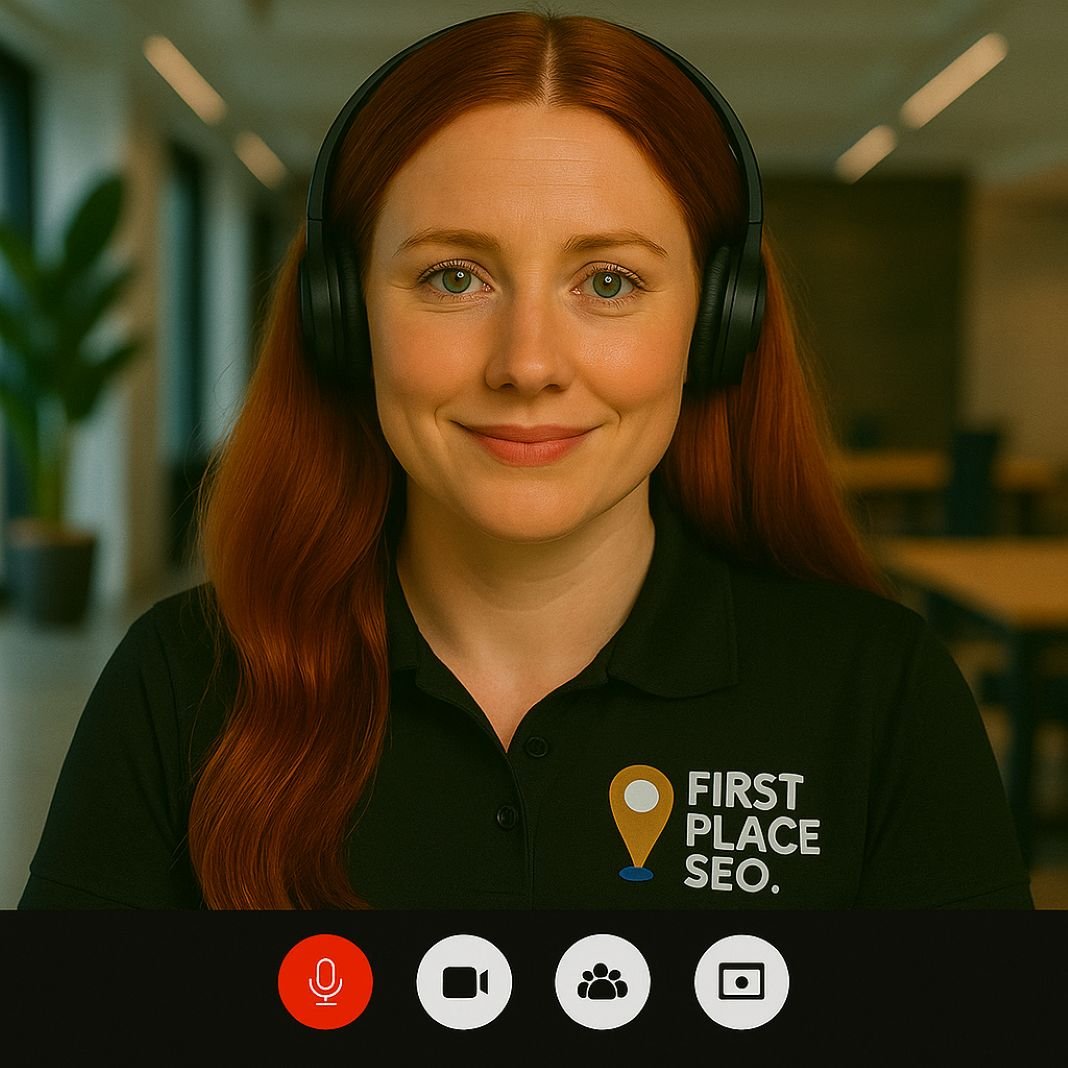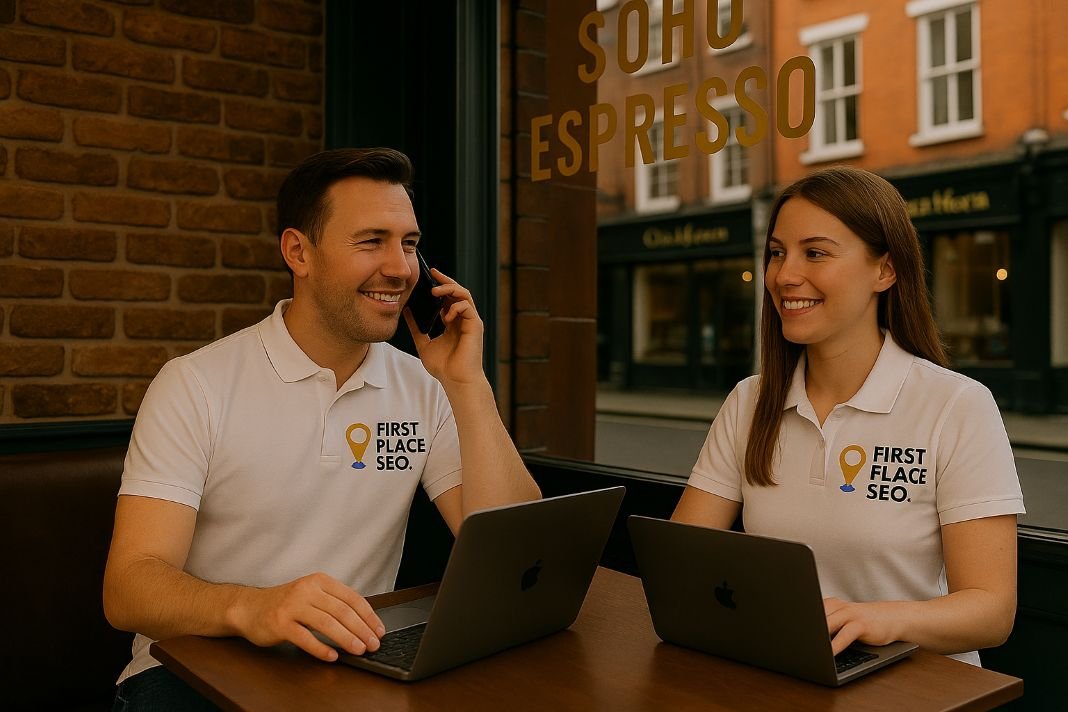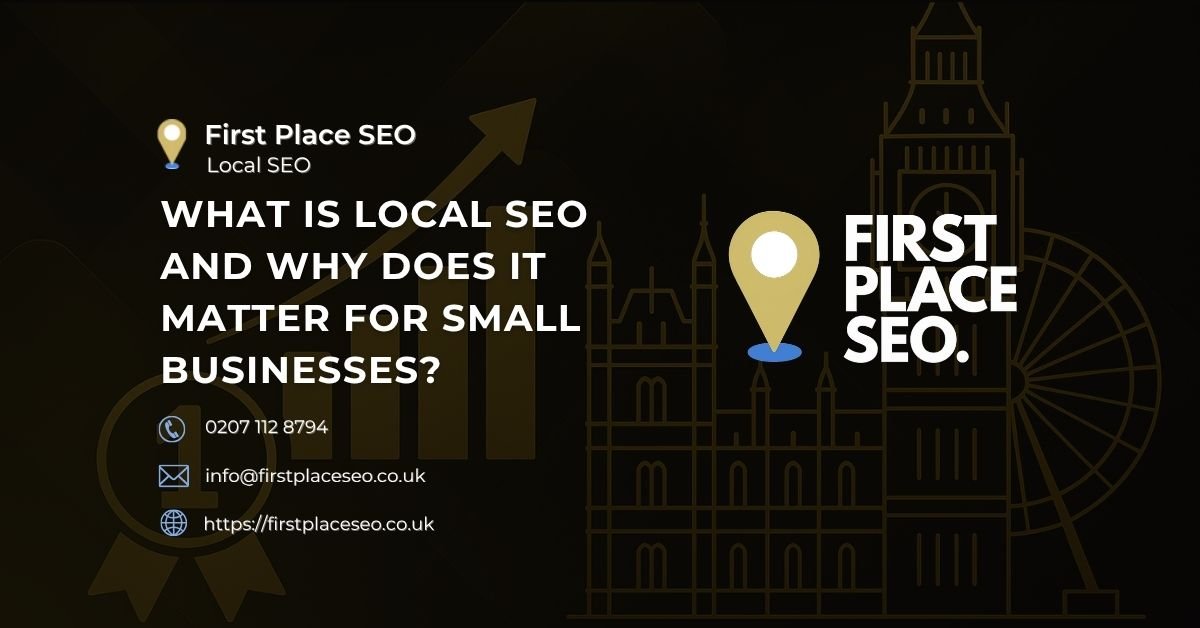What is Local SEO and why does it matter for small businesses?
Local SEO is the process of improving how your business appears in local search results when people nearby look for your services or products. So, when someone types “plumber in Leeds” or “best hair salon near me” into Google, your business stands a better chance of being seen. This visibility leads to more local interest, more visits, and often more sales. With more people using mobile phones to search on the go, and Google constantly tweaking how it delivers results based on location, local SEO has become a practical and necessary step for any small business that wants to be found.
Here's What We Have Covered In This Article
Introduction to Local SEO for Small Businesses
Real-world Search Example: “Coffee Near Me”
You’re out and fancy a coffee. You pull out your phone and search “coffee near me”. Straight away, you get a list of cafés nearby, showing reviews, photos, and how far they are from where you’re standing. That’s local SEO doing its job. It helps small businesses appear right when local customers are actively searching for something they need.
The Concept of Geo-Targeted Search Visibility
Local SEO works because search engines like Google use your location to decide what to show you. They want results that are not just relevant to your words, but also to where you are. So, if you run a small bakery in Nottingham, Google uses that information to match you with someone searching nearby for “fresh bread”. This is geo-targeting, and it’s become one of the main ways people now find businesses near them.
Why Local SEO is Different from Traditional SEO
Traditional SEO is about showing up in results that could come from anywhere in the country or world. Local SEO is about being found by people nearby. It’s shaped by different things – like how close your shop is to the searcher, how many good reviews you’ve got, and whether your opening hours are up to date. You’re trying to show up in a very specific place: your town or local area. That’s where local SEO really shines for small businesses.
Pro Tip :Use service plus location keywords in page titles and H1s, especially on city-specific landing pages. This improves relevance signals.
Need Google Business Profile Help?
We optimise, manage, and update your GBP to get you seen by local customers.
SEO vs Local SEO: Understanding the Difference
National vs Local Reach
SEO for a national audience might help a blog post about home repairs show up for someone in Glasgow or Birmingham. But if you’re a plumber who only works in Sheffield, being visible in Manchester won’t help you. Local SEO keeps things targeted. It focuses on helping people in your area find you, whether they’re walking down the road or searching from home.
Ranking Factors Unique to Local SEO
Relevance Signals
Google looks at what your business does and whether it matches what someone is searching for. So using the right categories, having location-specific content on your site, and writing in a way that matches what locals are searching for can all help.
Proximity Signals
How close someone is to your business when they search really matters. If you’re a barber in Coventry, someone searching from just a few streets away is more likely to see your listing than someone on the other side of town.
Prominence Indicators
Google also looks at how well-known your business is online. Things like how many reviews you’ve got, how often people mention your business in local directories, and whether local sites are linking to you all help build your visibility.
Pro Tip: Respond to every review – even neutral ones. Google values active business engagement and users notice when you care.
Why does Local SEO matter for small businesses?
Local SEO can directly affect how many people walk through your door or ring your number. According to research, around 88 percent of people who search for a local business on their smartphone end up calling or visiting that business within a day. These are customers who are ready to take action.
Search Behaviour Shows Intent to Buy
When people search with local intent, like “emergency dentist near me” or “electrician in Croydon,” they are not doing it for fun. These searches often mean someone needs help soon. Ranking in those searches puts your business in front of people who are prepared to act.
Reviews, Visibility, and Local Interest
Reviews, especially Google Reviews, contribute heavily to visibility. A business with consistent five star ratings and detailed responses to customer feedback appears more trustworthy. Visibility in local packs or on Google Maps boosts the chances of getting chosen over a less visible competitor.
Small Businesses Compete More Fairly
Local SEO helps level the playing field. A family run shop in Norwich can appear above a big chain in local results if the information is accurate, customer reviews are strong, and the site is optimised for mobile users. That kind of targeted presence makes a real difference for independent businesses.
Connect With Local Readers
For businesses looking to reach nearby customers, local SEO brings opportunities that national campaigns cannot. It supports word of mouth and local loyalty by helping people find and support services in their own area.
Google Business Profile: Setup and Optimisation
What is a Google Business Profile and why should you use it?
Google Business Profile is a free tool that allows your business to appear in local search results and on Google Maps. It displays your opening hours, contact details, reviews, photos, and updates. When it is set up correctly, it can significantly increase your visibility to nearby customers. It also plays a key role in local ranking signals, such as relevance, distance, and prominence.
Claiming and Verifying Your Profile
Start by searching for your business on Google. If it is already listed, claim it. If not, create a new listing. You will need to verify ownership, which usually involves receiving a postcard with a code at your business address. Once verified, you gain control over the listing and can update it as needed. Keep information such as business hours, categories, and service areas accurate at all times.
Optimising for Visibility and Trust
Include high-quality images of your location, products, or work. Choose the most relevant categories and add secondary ones if they apply. Write a clear and helpful business description using keywords related to your services and local area. Encourage satisfied customers to leave reviews. Regular updates, such as posts about events or seasonal offers, help keep your listing active and engaging.
Boosting Local Map Presence
Businesses that show consistent NAP details (name, address, phone number), respond to reviews, and receive regular engagement from local users are more likely to appear in the Local Pack and Google Maps. Internal linking to your profile from your website helps reinforce its importance to search engines. For example, linking a “Contact Us” or “Visit Our Shop” page to your Google Business Profile strengthens that connection.
Local Keyword Optimisation for Website Content
Why do local keywords matter for your website?
Local keywords help your site match search queries with a location based intent. For example, someone searching “roof repair in Preston” expects to find businesses nearby. Using location specific keywords in your page titles, meta descriptions, headers, and body content helps search engines understand where you operate and what you offer.
Using Location and Service Based Keywords
Each core page on your site, including the homepage and service pages, should mention the city or towns you serve. Create content that targets specific areas. Instead of saying “we offer accounting services”, say “we offer accounting services across Manchester and Stockport”. Include these local keywords in your headings and within well written, natural sounding paragraphs.
Creating City Specific Pages
If you serve multiple towns or neighbourhoods, create a dedicated page for each one. These pages should not be identical. Each should include tailored content that speaks directly to the needs of that location. Add useful information like local case studies, service details, and links to local resources or landmarks. Internal linking between these pages and your main service pages helps both users and search engines navigate the site.
Supporting Internal Linking Strategy
Use internal links to connect location focused blog posts to core service pages. For example, if you write a blog post on “Choosing the Right Electrician in Hull”, include a natural link to your electrical services page. This improves site structure and supports keyword relevance across multiple pages.
Online Reviews and Reputation Signals
How do reviews affect your local SEO?
Reviews are a strong trust signal for search engines and customers alike. Google factors in review volume, sentiment, and recency when deciding how high your business appears in local results. A steady stream of positive reviews can improve your rankings and encourage more people to get in touch.
Asking for Reviews the Right Way
After a successful job or sale, ask customers to leave a review. Make it easy by sending a direct link to your Google Business Profile review section. Train your staff to recognise good moments to ask. A friendly, personal request often works better than a generic email.
Responding Builds Trust
Replying to reviews shows you are active and care about your customers. Thank those who leave kind words, and respond to criticism politely and constructively. Do not ignore bad reviews. Address the concern and explain any changes you have made.
Schema Markup and Review Signals
Use review schema on your website to display star ratings directly in search results. This structured data helps search engines connect your reviews with your business. It also makes your listing more eye catching and informative.
Boost Your Local Rankings
Let’s help your business show up first in local searches with smart SEO strategies that work.
NAP Consistency and Citations
Why is NAP consistency important for local SEO?
NAP stands for name, address, and phone number. These core details need to be identical across every site where your business is listed. Google compares this information to determine if your business is genuine, active, and trustworthy. Even a minor mismatch such as using “Street” on one listing and “St” on another can cause confusion and affect rankings.
Where should your business be listed?
Start with major directories like Google Business Profile, Bing Places, Yelp, and Yell. Industry specific directories can also help. For example, if you run a dental practice, include listings on NHS Choices. Listings in locally trusted directories send strong local relevance signals to search engines.
Tools that help manage citations
Managing dozens of listings manually can be time consuming. Tools like BrightLocal, Moz Local, and Whitespark make it easier to audit and update listings. They help identify inconsistent NAP details and track which directories matter most for your industry. Keeping these listings accurate supports better visibility and improves your reputation across the web.
Creating Hyper Local Content
What is hyper local content and why does it work?
Hyper local content is specific to your town, neighbourhood, or even a postcode. It connects directly with people searching for businesses nearby and increases relevance in search engines. It is a useful way to stand out from broader competitors by showing that your business knows the local area and serves it well.
Ideas for location based content
Write blog posts that highlight local news, seasonal events, or community updates related to your services. For example, a pest control company in Reading might write about “Common Autumn Pests in Reading Homes.” You could also create content like “Top Five Questions About Plumbing in Coventry” or spotlight case studies that show your work in specific neighbourhoods.
Structuring city or neighbourhood pages
City specific pages should have unique content and avoid repetition. Include service details, testimonials from clients in the area, and information about landmarks or street names that local readers will recognise. Add a local FAQ section that addresses common customer queries specific to that location. Use internal links to connect these pages to your main service and contact pages.
Mobile Optimisation for Local Search
Why mobile experience matters for local SEO
Most local searches happen on mobile. If your website loads slowly or is difficult to navigate on a phone, visitors will leave quickly. Google considers user behaviour, including bounce rates and loading times, as part of its ranking system. A mobile friendly site helps you retain traffic and improves your position in search results.
Key technical areas to focus on
Ensure your site uses responsive design so it adjusts to any screen size. Optimise images and code to reduce load times. Use clear fonts and large tap targets to make navigation simple. Check that maps and call buttons are easy to find and work correctly. Core Web Vitals such as Largest Contentful Paint and First Input Delay help measure and improve the mobile experience.
Testing your site for mobile readiness
Use Google’s Mobile Friendly Test and PageSpeed Insights to see how your site performs on smaller screens. Regular testing ensures that updates or design changes do not affect usability. Review your site on multiple devices and browsers to spot any formatting issues early.
Local Link Building Strategies
How do local backlinks help your visibility?
Local backlinks are links from other websites in your community pointing to your own. They act as a trust signal to search engines and support your site’s authority within your area. When Google sees that your business is mentioned by local blogs, schools, newspapers, or business groups, it is more likely to prioritise your listing in relevant local searches.
Where to find local link opportunities
Start with directories managed by local councils or chambers of commerce. Local newspapers often accept business profiles or guest columns. Community event pages, sponsorships for charity runs, and partnerships with schools or clubs can also result in links. When your name appears on sites that already rank well locally, the value of that link improves your standing too.
Outreach with relevance in mind
Rather than asking for generic backlinks, approach local organisations with a reason. For example, offer a testimonial for a supplier or participate in a community feature. Provide helpful content that local websites may want to link to, such as how-to guides or area-specific advice. Keep your outreach genuine and focused on mutual benefit.
Schema and Structured Data for Local Businesses
What is local business schema and how does it help?
Schema markup is a type of code that helps search engines better understand your business. Adding local business schema to your site makes it easier for search engines to connect your website with accurate business information, such as operating hours, location, services, and reviews. This can improve how your listings appear in search results, including rich snippets.
Using JSON LD for structured data
JSON LD is the recommended format by Google for implementing structured data. Include information such as your business name, address, phone number, opening hours, and service area. Add review schema to show ratings, and event schema if you host or participate in local happenings. Use Google’s Rich Results Test to check that your markup is implemented correctly.
Embedding maps and linking to verified profiles
Add a Google Map embed on your contact page that clearly shows your location. Link this to your verified Google Business Profile. Structured data combined with well-placed links helps build consistency between your site and trusted third party sources.
Local SEO Checklist and Ongoing Optimisation
What should be on your local SEO to-do list?
Break down your approach into setup, optimisation, and maintenance tasks. Start by claiming and verifying your Google Business Profile. Check NAP details across all major directories. Use location keywords on your homepage, service pages, and contact page.
Optimise content and monitor reviews
Add internal links that connect city pages to your service details. Update your blog regularly with local content. Ask customers for reviews and reply to them. Track your visibility using tools like BrightLocal or Google Search Console. Keep an eye on what competitors are doing locally and adjust your strategy if needed.
Schedule regular performance checks
Check site speed, mobile usability, and local ranking positions each month. Use analytics to spot which pages are performing well and which need improvement. Monitor keyword trends to find new opportunities for growth in your area.
Summary
Local SEO helps small businesses connect with people in their local area who are actively searching for the services they provide. It supports better visibility in search results, improves trust through reviews and accurate listings, and builds stronger relationships with local customers. By keeping your business information consistent, writing content that speaks to local audiences, and building connections through backlinks and community involvement, you make it easier for search engines and people to find and choose your business.
FAQs
What is the difference between local SEO and traditional SEO? Local SEO focuses on getting your business found by people in your area. It relies on proximity, Google Business Profile, reviews, and local keywords. Traditional SEO targets broader audiences with a national or international focus.
How often should I update my Google Business Profile? Check your profile at least once a month. Make sure hours are accurate, respond to new reviews, and post updates or photos when something changes.
Do I need separate pages for every location I serve? If your business serves multiple areas, creating separate pages helps. Each should include unique content that targets the specific location, such as service details and local testimonials.
How many reviews do I need for local SEO to work? There is no exact number, but a steady stream of recent, high-quality reviews makes a strong impact. Aim for consistency rather than volume alone.
What tools can help me track my local SEO performance? BrightLocal, Moz Local, and Google Search Console are useful for monitoring search performance, listing accuracy, and keyword rankings. These tools also help identify areas for improvement.





